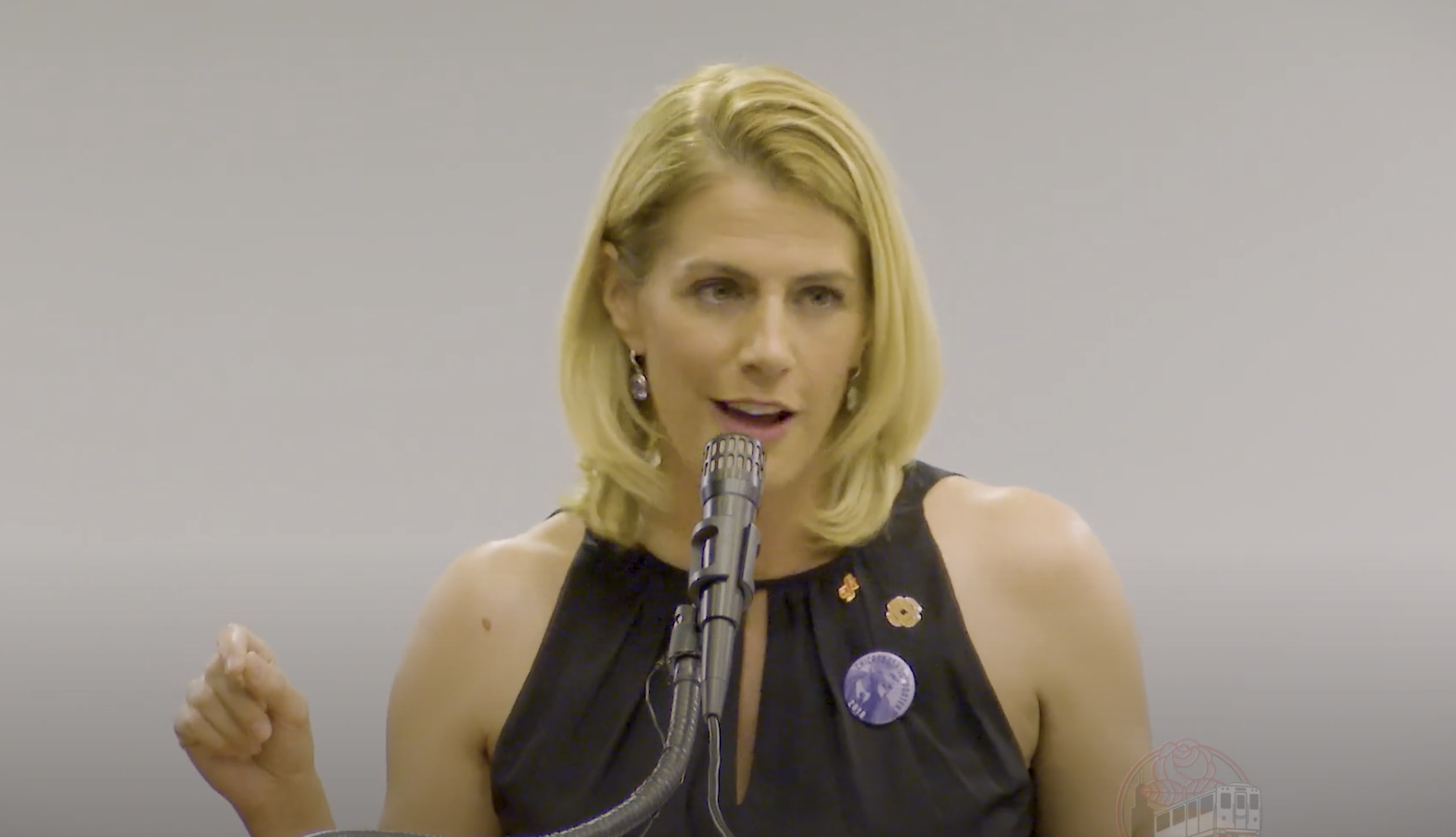Sara Nelson, president of the Association of Flight Attendants, speaks at the 2019 Democratic Socialists Association meeting in Chicago.
Sara Nelson, president of the Association of Flight Attendants, speaks at the 2019 Democratic Socialists Association meeting in Chicago.
Delta Airlines is headquartered in Atlanta, Ga.
But last Nov. 1, when one of the largest labor unions in the U.S. announced it would try once again to organize its flight attendants, New York Magazine was first with the story.
“Among major U.S. airlines, Delta is an outlier: It’s the only one whose flight attendants aren’t unionized,” reporter Sarah Jones wrote, casually explaining that the last time they tried the vote failed due to “unprecedented intimidation” and because airline “bombarded them with inaccurate, anti-union talking points.”
Jones quoted the campaign’s leader, Sarah Nelson, boasting that “the energy and excitement for our Flight Attendant union is palpable” and that she had heard from “thousands” of flight attendants who wanted to be part of her union.
That’s her union, the Washington, D.C.-based Communication Workers of America (CWA), which also happens to be the union of the article’s author.
What Sarah Jones didn’t write is that she, too, is a member of the union trying to organize those Delta’s flight attendants.
Jones is a member of NewsGuild, which, like the Association of Flight Attendants, is part of the 700,000 member strong CWA, one of the largest and most powerful unions in the country.
To be fair, she wasn’t the only CWA member talking her book that day.
Newsguild member Leslie Josephs, of CNBC, also excitedly reported the Delta campaign, explaining that it came amid “an emboldening of rank-and-file employees, clamoring for a bigger piece of corporate profits.”
“Delta was criticized on social media earlier this year after photos of anti-union posters that suggested workers spend their money on a video game system or tickets to a baseball game instead of union dues,” Josephs wrote.
In her report on the campaign, reporter Kristen Leigh Painter of the Minneapolis Star-Tribune -- Delta’s third-largest hub is in the Twin Cities -- described fellow CWA union member Nelson as “a rising star in the U.S. labor movement” and the company as having “a reputation for strong anti-union sentiment.”
To be sure, U.S. journalists, typically left-leaning, have naturally and frequently exhibited general pro-union sentiment in their news reporting.
But historically rare have been specifically favorable sentiments in reporting upon the activities of one’s own labor union, without disclosure to readers.
Until now.
“One thing we can’t remain objective about is our own demise,” said Jon Schleuss, president of NewsGuild, told New York Times reporter Ben Smith in May.
News Guild and the Writers Guild of America have organized more than 90 newsrooms and 5,000 journalists since 2015, Smith estimated. Which was changing how union organization drives like that at Delta would be covered, forever.
“These millennial leaders’ experiences differed sharply from those of the veteran newspaper men who had long run the unions,” Smith wrote. “Their sensibility was shaped not only by social media but by the progressive political moment.”
And that moment means that reporters would no longer objectively question the inherent value of labor union membership. From here forward, Smith said, journalists would “express solidarity with the (union) workers they cover.”
Some journalists are seeking to temper their overt biases with disclosure.
Qualifying a recent report on police unions, journalist Alexia Fernandez Campbell of the left-wing Center for Public Integrity described herself as a union member herself, albeit not of theirs.
“The author of this article is a member of the Washington-Baltimore NewsGuild, which is affiliated with the Communication Workers of America, a member union of the AFL-CIO,” read an Editor’s note prominently displayed in the story body.
In April, New York Magazine’s Jones authored a piece, “The Coronavirus is radicalizing workers,” calling for more unionization as a response to COVID-19.
Because they aren’t unionized, “essential corporations are actually placing the public at risk,” Jones wrote.
And she quoted her fellow CWA member Nelson, this time declaring the lack of unions in the U.S. has “put us in the worst possible position to confront this crisis.”
The Association of Flight Attendants (AFA-CWA) represents 50,000 flight attendants at 20 different airlines.
Based in Washington, D.C., NewsGuild represents 24,000 journalists and other employees at media organizations.


 Alerts Sign-up
Alerts Sign-up